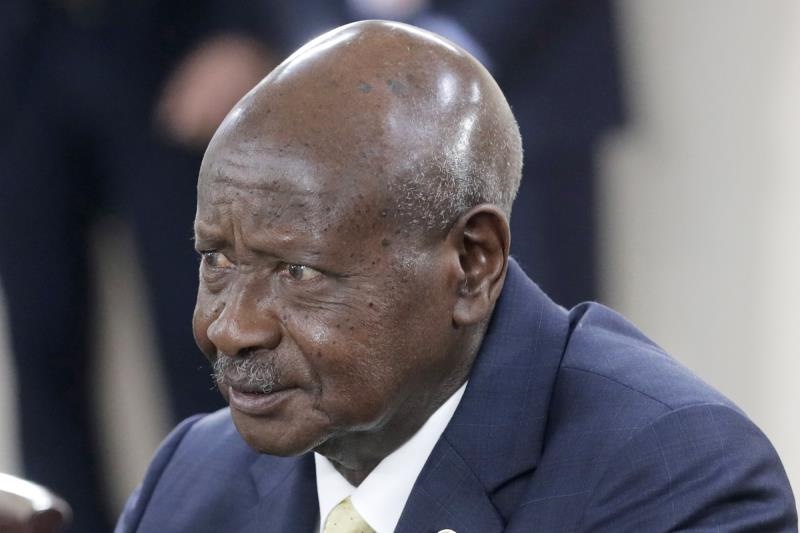Regional
Sinister plot: Museveni builds Burundi, DRC roads

Museveni, sworn-in for an ominous sixth term just over a week ago, is deluding himself if he thinks Ugandans - and neighbours - are fools to believe he has good intentions.
There
is something sinister about Ugandan President Yoweri Museveni's scheme to build
roads in the Democratic Republic of Congo, and lately, Burundi, in the name of
boosting trade links with neighbouring countries yet the state of roads in his
country generally remains deplorable.
Museveni,
sworn-in for an ominous
sixth term just over a week ago, is deluding
himself if he thinks Ugandans - and neighbours - are fools to believe he has
good intentions. His earlier offer to upgrade hundreds of kilometres of dirt
roads in the east of the DRC, to bitumen, raised eyebrows.
Critics
rightly pointed out that he should improve Uganda's roads instead of doing so
in a foreign country. But a defiant Museveni said improved roads in DRC will
facilitate trade between the two countries and that larger trade earnings will,
in turn, avail more revenues to build better roads in Uganda.
Critics have pointed out that Museveni should focus on improving Uganda's very poor roads instead of spending tax payers' money on foreign countries' roads
"MPs
insulted me over these roads to DRC but I was not moved," Museveni told
Ugandans last December. For years now, all Ugandans who care know that Museveni
has invested so much money, time and energy into sabotaging neighbouring
Rwanda's development trajectory because, by and large, Rwandan leader Paul
Kagame's development achievements just embarrass him.
Among
others, Museveni's deadly scheme became more public when, over five years ago,
he opted to prioritise the Standard Gauge Railway (SGR) project to South Sudan
instead of continuing to Rwanda as initially agreed.
Lately,
reports indicate that Burundi President Évariste Ndayishimiye, or any other
senior officials from Gitega, is expected in Uganda next week to sign an
agreement to build a road linking Uganda to Burundi through Tanzania, signaling
Museveni's determination to undermine and isolate Rwanda.
In Kampala alone, 75 percent
of the 600km of paved road network has outlived its design life. The poor state
of the roads has caused unqualified losses to the city, its dwellers and those
transiting through it. About $800m is lost annually in vehicle maintenance. Close to $1.5m a day is lost in travel time
and traffic delays while another to $100 to $200m is lost by businesses and
damage to property across the city each year.
Ugandan
media has reported that Uganda and
Burundi are finalising plans to build a new road to promote trade and commerce
and circumvent a barrier presented by Rwanda’s closure of the Gatuna border in
early 2019. What is often highlighted, as has been the case ever since
relations between the two neighbours deteriorated, was "Rwanda’s closure
of the Gatuna border." Such headlines continue to mislead those not in the
know as the root causes of the conflict between Uganda and Rwanda are always
ignored.
The
real issues are the former's continued economic sabotage, kidnapping, torture
and killing of Rwandans as well as habouring of negative forces or terrorist
groups intent on destabilising Rwanda. At some point in the recent past when he
could not bury the evidence of his conspiracy, Museveni admitted meeting
anti-Rwanda terror group's senior officials like Charlotte Mukankunsi and
Eugene Gasana.
According
to recent reports, the project of a new road through northern Tanzania up to
Burundi’s Kobero border was agreed upon during a meeting between Museveni and
Ndayishimiye during the latter’s May 13-14 state visit, after he attended
Museveni's inauguration on May 12. Museveni, the schemer, of course, used the
occasion to full advantage. He rolled a charm offensive which, among other
things, entails disrupting any hope of a rapprochement between Burundi and
Rwanda. Let's not forget that Museveni has, for long, been working behind the
scenes to spoil the two countries' relations.
No
one denies the fact that large infrastructure projects and increased trading
lead to improved security and social welfare. But the unanswered question is: how, really,
is Museveni thinking out of the box in terms of promoting regional
collaboration and integration in a practical way when he continues to harbour
and support terrorist groups intent on militarily attacking Rwanda?
Another
more ominous question is whether the East African Community - the most rapidly
integrating regional economic bloc on the continent - will, for a second time,
survive the upheavals that saw it come crashing down in 1977. Museveni's stance
on Rwanda, if unchecked, might cause the disintegration of EAC in the long
term.

